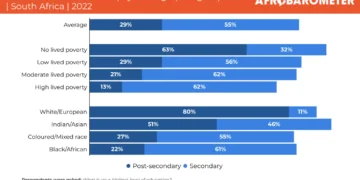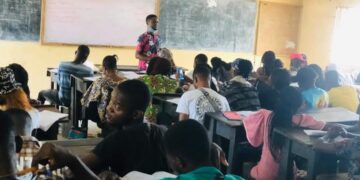
This article discusses the teething challenge of brain drain and its grave effects on the Nigerian university system, which poses a serious threat to the quality of education in the country. It also identifies low funding as the major factor that fuels the alarming level of degradation and results in poor compensation plans, insufficient university funding and lack of autonomy. It proffers workable solutions for the revitalization and resuscitation of the system to ensure its sustainability for national growth and development.
The university system is described by Oni (2010) as a nation’s knowledge hub, which works assiduously towards its socio-economic and technological improvement through its ability to assess their relevance for national needs as observed in developed countries. The National Policy on Education (2014) also mandates the system to contribute towards national growth through high-level manpower training, the provision of accessible and affordable quality learning opportunities, among other attainable goals.
Unfortunately, the terrible reality of Nigerian higher institutions, especially public institutions calls for sober reflection as it continues to experience an unprecedented, preternatural level of brain drain. The Punch post of November 27th 2023 raised the alarm that Nigerian institutions are grappling with understaffing as 27 lecturers had reportedly resigned from two faculties at the University of Lagos, with about 500 academic vacancies at the University of Ilorin, among others who have followed suits in other universities. For how long will the nation continue to lose its experienced and locally trained intellectuals to other countries? Don, et al (2020) posit that brain drain affects the engagement of qualified individuals who could have assisted in actualizing their universities’ goal to have a comparative advantage among other universities of the world in terms of teaching, research and innovation.
Regrettably, the UNESCO’s recommendation that 26% of the national budget should be earmarked for the education sector has been continually ignored by former and current administrations. Professor Abubakar Rasheed, while delivering a speech at the 2023 National Reunion Conference of Awolowo University Mushin Graduates Association (UNIFEMGA) at the Obafemi Awolowo University, also confirmed that low funding, which grossly affects learning, teaching and research, is the chief factor responsible for the declining standard of education in the country. This negatively influences all facets of the institutions resulting in their inability to settle electricity bills, stock their libraries with current books and advance technologically in compliance with global standards. Poor staff development, inadequate research facilities, terrible compensation systems are screamingly evident in the ivory towers due to the indifference and insensitivity of the government.
To address this anomaly, attractive remuneration should be prepared and implemented to curtail the surge and its consequences. The Federal Government in collaboration with state governments needs to urgently create an enabling environment for academics’ motivation and commitment to service with attractive salaries. Trips for international conferences and trainings can also be funded with the support of investors and philanthropists.
The universities should be granted autonomy to function optimally without any external interference from the government. Appointments into academic positions should not be based on ethnicity, favouritism and politics. The services of vibrant retired academics can be engaged as adjunct lecturers for other budding academics and universities to benefit from their wealth of experience as international scholars.
The implementation of the agreement reached with the Academic Staff Union of Universities (ASUU) is pertinent to abate regular strike actions that disrupt universities’ academic calendars. Candidly, no university can thrive with persistent industrial actions when scholars are supposed to teach, research, and embark on community services as expected. Synergy should be built between the government and university unions towards their revivification in order to build highly ranked institutions among their counterparts in the world.
REFERENCES
The Punch (November 27 2023). Lecturers shortage hits vasities, ASUU blames japa, IPPIS
Federal Government of Education, (2014) National Policy on Education. Abuja
Don M. Braridam, et al (2020) University Administration and the Challenges of Brain Drain in Nigeria. IOSR Journal of Business Management (IOSR-JBM), 22 (4), 2020, pp. 55-65
Oni, B. (2010) Capacity Building Effort and Brain Drain in Nigerian Universities. ECA Regional Conference on Brain Drain and Capacity Building in Africa
Samuel Tolulope Alimi is the visionary founder and lead scholar at English TV, an online platform established for the teaching of the English language on social media platforms. He also earned a BA (Ed) from the prestigious Olabisi Onabanjo University, Ogun State, where he studied English and Education.
As a Grammar Columnist with the Peoples Daily newspaper, one of the foremost and trusted national newspapers, he writes about Nigerian English on Page 23 of every Saturday’s publication headlined COMMON ERRORS IN ENGLISH WITH SAMUEL ALIMI. In his intellectual odyssey, he has written over 30 detailed articles that have been published for his voracious readers across several states.
As a goal-oriented ambassador of Scholarship IQ, Samuel Tolulope Alimi assiduously promoted the organization’s mission to build the world’s largest African student directory in two local governments in Nasarawa State, Nigeria. He also has a wealth of hands-on experience in ghostwriting autobiographies, community service, and research through his internship at SO41 Educational Consultancy, Ogun State.




































































 EduTimes Africa, a product of Education Times Africa, is a magazine publication that aims to lend its support to close the yawning gap in Africa's educational development.
EduTimes Africa, a product of Education Times Africa, is a magazine publication that aims to lend its support to close the yawning gap in Africa's educational development.

